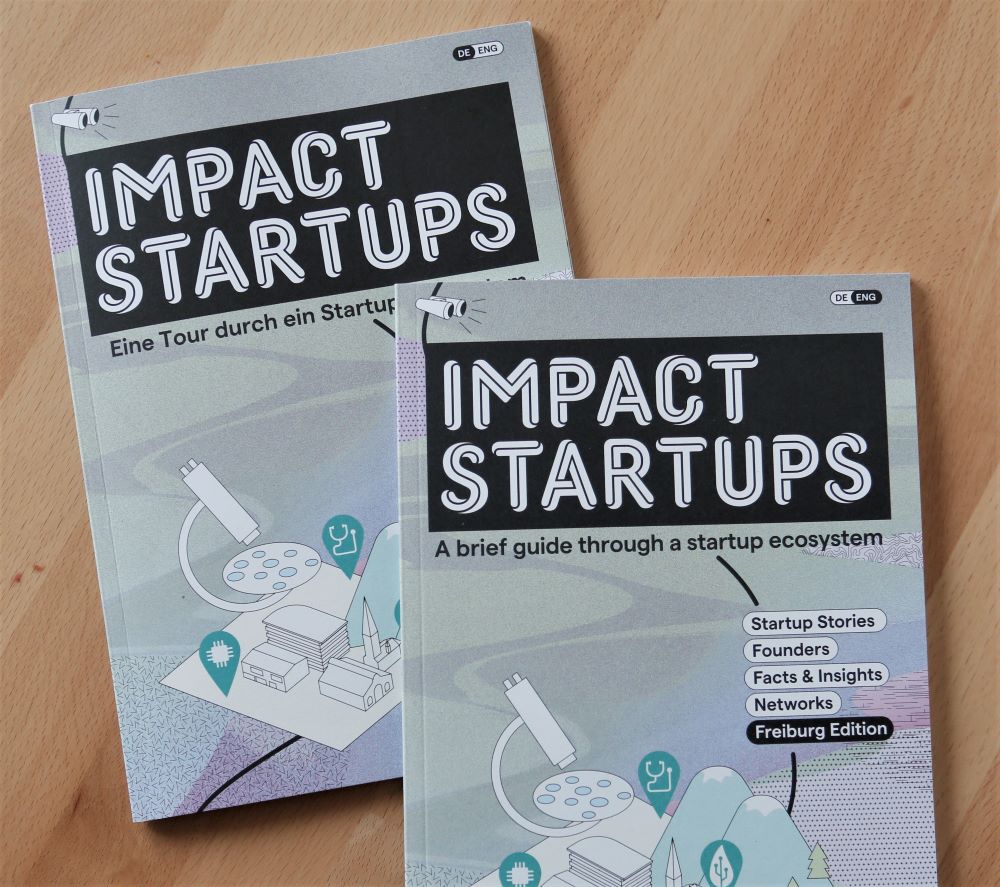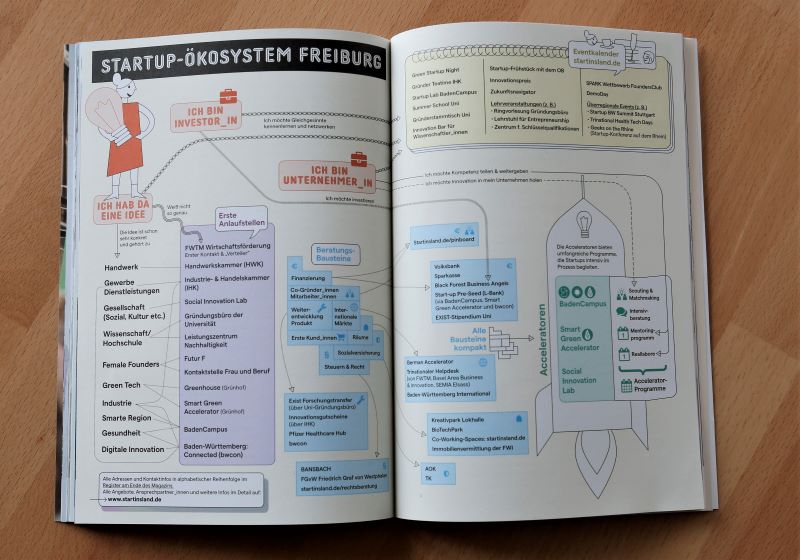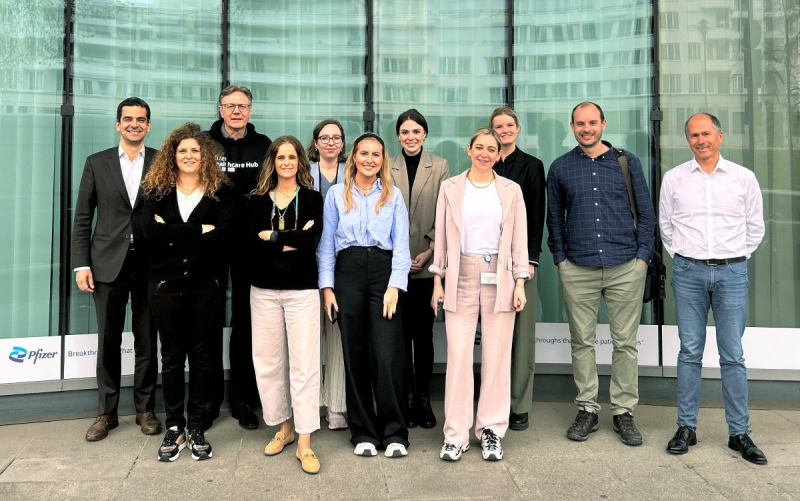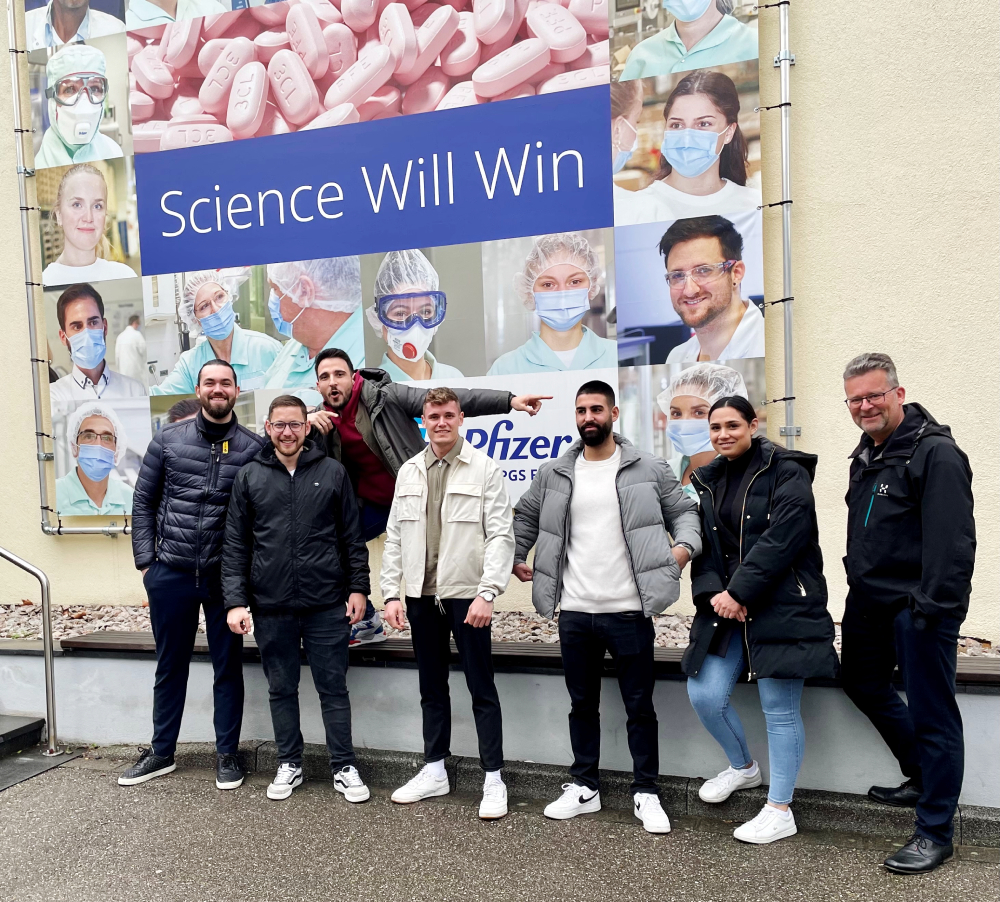
Freiburg has its own startup magazine – the Pfizer Healthcare Hub is right in the middle of it instead of just being there
Old town, Bächle, wine, SC and start-up city: we're talking about Freiburg. In the city comparison of start-ups per inhabitant, the Black Forest metropolis, which is rather manageable with around 240,000 inhabitants, took 3rd place, ranking directly behind Berlin and Munich. The start-up initiative of the Freiburg Startinsland region has now published its own magazine: "IMPACT STARTUPS: A tour through a startup ecosystem". The magazine introduces the Freiburg startup scene and its important players, provides insights into the development of young companies, is a guide for founders - and provides an answer to the question: "Freiburg in 3rd place - really now?"
Some insights into the freshly printed magazine:
Startup stories about gamechanger solutions: Wireless charging technology for self-driving electric vehicles, refrigerator-sized Constellr satellites that detect impending drought from space and secure crop yields, analysis discs that detect skin diseases and light sources for optogenetics research: Here you will find the success stories of Wiferion, the startup that has just been bought by Tesla, Constellr, Opto Biolabs and Dermagnostix.
Co-working, startup support, university location and startups: On the Freiburg startup map, you can see at a glance who is sitting where and what else Freiburg has to offer.
Guide for founders, companies and investors: All contact points, consulting modules and accelerators in Freiburg are outlined in a clear graphic - the Pfizer Healthcare Hub is also included as a contact point for health and tech companies that want to further develop their product.

Startinsland start-up initiative and partners: Of course, the contact points in Freiburg have a face, in this case many: The contact persons of the start-up initiative of the Freiburg Startinsland region are all visible on pages 52 and 53, and Peter Neske is there as the contact person for the Pfizer Healthcare Hub.
And how does Freiburg now make it to 3rd place among start-ups?
One of the factors is certainly the dynamic and well-networked startup ecosystem in Freiburg, which is supported by the start-up initiative Startinsland and its partners.Jannis Gilde, Project Manager Research at the Startup Association, cites talents as another factor. "They like to be where it is pleasant to live and where there are good universities," says Gilde.
Sources:
Next Generation Startup-Neugründungen in Deutschland (August 2022)

1000 days of DiGA: MedtecLIVE in Nürnberg
On May 23, 2023, Selfapy's Co-CEO Adham Kassab and Maja Hoock, Innovation Lead of Pfizer Healthcare Hub Berlin, were on the Innovation Stage at MedtecLIVE in Nuremberg for the session "1000 days of app on prescription - insights into status quo, approval & collaboration opportunities." They presented Pfizer's world-first DiGA: "Selfapy's online course for chronic pain".
MedtecLIVE takes place annually in Nuremberg or Stuttgart and is the central European trade fair for medical technology. The latest medical technologies are presented at the three-day event; focus topics are digitalization, production of the future, transformation and regulation.
The DiGA cooperation between Selfapy and Pfizer at the Innovation Stage
Recently, collaboration partners Pfizer and Selfapy were pleased to announce the inclusion of "Selfapy's online course for chronic Pain" in the official DiGA directory: the approval process was a real challenge, said Adham Kassab. He emphasized that DiGA must go through a rigorous evaluation process to be included in the BfArM (German Federal Institute for Drugs and Medical Devices) directory. These strict quality and safety rules of DiGA are a quality feature in contrast to freely available health apps without prescription, he said. Patients, physicians and therapists can use the certified apps on prescription to support therapy and monitor health status. Kassab also reported on potential hurdles in meeting regulatory standards and how they can be overcome. Support would include strategic partnerships.
Maja Hoock shared her experiences with the visitors and explained Pfizer's role as a DiGA collaboration partner: "With our work in the Pfizer Healthcare Hub, we help startups successfully master the difficult phase of market launch - and enable patients to access digital applications."
Pfizer supported Selfapy in its market launch with marketing, PR and the sales and medical expertise of a research-based pharmaceutical company. "Apps on prescription have been available in Germany for 1000 days - a success story that for us has just been crowned with the launch of Pfizer's first DiGA worldwide. We generated a lot of insights and learnings with this DiGA collaboration. Now we are evaluating them to further accelerate processes and make them globally usable for Pfizer," says Maja Hoock about the importance of this partnership for the global Pfizer organization.
Keynote speeches around DiGA
Malte Fritsche (BITKOM) moderated the keynote presentations on the Innovation Stage and first announced Vincent Erdmann from Digital Oxygen. The latter spoke about DiGA basics and said that three years after the introduction of the law, little was known about DiGA among the general public. His presentation was titled "1000 Days of DiGA: Between Innovation and Regulatory Hurdles." Michael Schober of mediatixx used his own survey analyses to show how DiGA is used in everyday practice and how practice software can interact with DiGA. Paul Burggraf from Thryve talked about interoperability of digital health apps in his keynote presentation.
The conclusion of the one-and-a-half-hour session on the status quo, approval and cooperation opportunities for DiGA: Even if success stories like Selfapy have been written, the German healthcare system still has a few lessons to learn. The processes surrounding the DiGA must be further optimized in order to make the digital applications available to patients more quickly.

German healthcare industry, digitalization and DiGA: Portuguese delegation visits Pfizer Healthcare Hub
On Thursday, April 27, 2023, the Pfizer Healthcare Hub in Berlin opened its doors to a Portuguese delegation with representatives of the digital life science industry. The delegation, composed of founders, partners and CEOs of the innovative companies BMD Software, Complear, Healthy Smart Cities and PLUX, was led by Joana Feijó, Business Development Director of Health at Cluster Portugal. The team around Pfizer Healthcare Hub provided insights into the digitalization of the German healthcare sector. During the discussion about current developments, opportunities and challenges of the digitalization of the healthcare sector, a mutually beneficial dialog with new impulses, insights and perspectives emerged.
The Pfizer Healthcare Hub as an enabler of digital collaborations
Thorsten Mintel, Director Strategic Innovation, introduced Pfizer to the visitors:inside and emphasized the importance of the Pfizer Healthcare Hub in his presentation: "With the Healthcare Hubs, Pfizer wants to further achieve its digital goals. New players like startups are helping shape the healthcare system of the future. We collaborate with them to benefit from each other." Maja Hoock, Lead of Pfizer Healthcare Hub Berlin, outlined the status quo of the digital healthcare market in Germany and the Digital Healthcare Act as the basis for reimbursable healthcare applications (DiGA). Using the three collaborations with Selfapy, Cortrium and Eila, Innovation Manager Paulina Achter drew a picture of how the Healthcare Hub works. "The Expert:innen team from Portugal showed us what a positive role digitalization can play where it is already actively lived. We are taking away many impulses and suggestions," said Maja Hoock. She outlined the challenges of the growth market DiGA and deepened the insights into the working methods of the Pfizer Healthcare Hub. In the subsequent Q&A session, participants discussed access to the German healthcare market and possible cooperation models for players in the Portuguese life sciences industry.
Take-away for the Portuguese representatives
The similarities and differences between the healthcare systems, especially with regard to mutual learning, were the focus at the end of the event. For the hub team, the insights and experiences of the Portuguese visitors with the digital infrastructure were profitable: Due to the strong political will of the Ministry of Health, Portugal is ahead of Germany in many areas. For the visitors, the insights into the German DiGA landscape were particularly valuable - for example, the requirements for data protection, user-friendliness, evidence of positive effects on care for inclusion in the DiGA directory, or the fast-track procedure.
We at Pfizer Healthcare Hub look forward to continuing this exchange!

Pfizer makes the case for cross-border innovation ecosystem
Kick-off for the cooperation between the Pfizer Healthcare Hub and the University of Applied Sciences and Arts Northwestern Switzerland: At the start of a joint project to optimize patient care, five students of the University of Applied Sciences and Arts gained exciting insights into Pfizer's highly automated production facilities at the Freiburg site.
Promoting resilient innovation ecosystems is one of the core tasks of the Pfizer Healthcare Hub, which the two teams in Freiburg and Berlin are advancing in a variety of ways - this time through a collaboration with the University of Applied Sciences and Arts Northwestern Switzerland. As part of the CreaLab teaching and development format, five students develop solutions for current social and economic challenges within a few days. The format is supervised by Prof. Dr. Tina Haisch, university lecturer and experienced consultant for innovation processes.
The students work together with experts, doctoral students, lecturers and companies such as Pfizer on a defined problem. Pfizer thus offers students the opportunity to deepen their knowledge using real-life practical examples: through the format, students not only learn about innovation management approaches in theory, but experience them first-hand. In return, Pfizer benefits from current methods, approaches and new perspectives. And by the way, the project brings the two countries in the border triangle a little closer together.
We wish the students every success in carrying out the project!